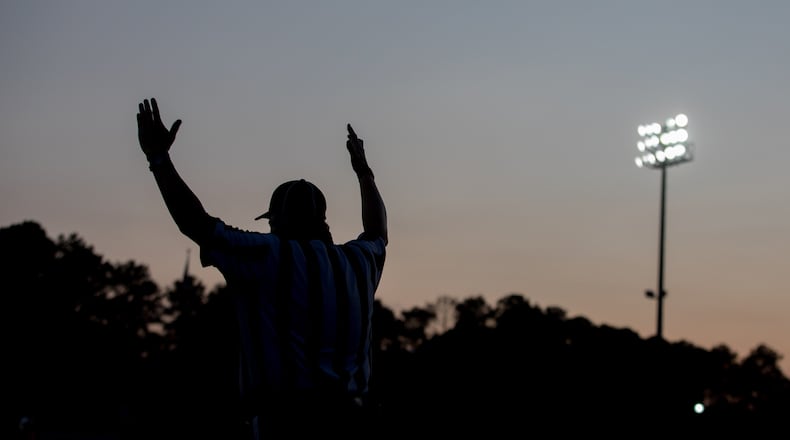Today’s interviewee is Rick Boedy, a longtime GHSA official who remains heavily involved in GHSA rules, training and educating at age 73. Boedy has worked state finals in three sports, 12 total. He helps write the annual state officials examination and evaluates playoff crews. He is regarded as one of the GHSA’s foremost officiating rules experts. Boedy started on Roswell’s 1968 state-winning football team and 1970 state-winning baseball team and played football at Florida. Boedy is a retired neonatal doctor.
1. It’s become commonly known among those who follow high school football closely that the GHSA doesn’t have as many officials as it would like. We’ve been hearing “officials shortage” for a few years now. What is the current state of officials and their numbers? How would you state the problem for those needing to understand it, and how has it changed the past few years (better or worse)? “Every sport is short of officials. Football games are moved to non-traditional nights such as Thursdays or Saturdays. There are some varsity games that are officiated with five-man crews when the usual is six or in some locations seven. Last year I went back and helped with basketball due to the shortage. In Georgia, numbers are down across the board. Reasons vary. Certainly COVID produced changes, but the downward trend, which is nationwide, started before then. Young men and women have more distractions, and if they played sports, they are aware of the verbal abuse officials receive. Nationwide, verbal abuse, and in rare instances physical abuse, is the primary reason younger officials leave officiating. More money has not added to the numbers. Football is a difficult game to officiate. There are 22 moving parts on any given play. Each official has certain keys he begins with, then expands his vision as the play progresses. Learning the nuances of the mechanics of officiating – being in the right position to make a call – takes several years of work. Many don’t want to put the time into learning, attending meetings, summer camps and film study. Basketball is another example. The rules have changed slowly but significantly. It is now hockey in tennis shoes. Lots of legal contact. The parent sitting in the stands watching his son or daughter play can be very verbal because the game is so different from when they played. Baseball officiating takes years of experience to develop a consistent strike zone. Kids throw and run faster. Ever hear the phrase ‘the tie goes to the runner?’ Well, that is simply not true. As a runner you must beat the throw. So rule changes and parent-coach-fan misconceptions create problems. In football, just the rule differences between high school, college and pro create problems as fans, parents, and some coaches simply don’t know the differences. So all of this together has added to the shortage.”
2. What are some of the strategies that the GHSA and officials associations have taken to address the problem, and what are suggestions you might have to help? “The GHSA and NFHS [National Federation of High School Associations] have partnered together with officiating websites to enroll new officials in all sports. Every week I write emails to prospective officials off that website for all sports. I would like to see more representation at career days, senior days and such events. With all the emails I write, maybe one in 10 actually follow through with making contact. The shortage is many fold, as you can tell.” [Persons interesting in becoming a high school sports official can click here for more information from the NFHS.]
3. What does the annual education of officials entail? From in-season training at the local level to state requirements, what is it they must do? “Annual education requires both local and state activities. For the GHSA, the individual official must attend a summer camp, do an online clinic and pass a rules test with a score of 85 or greater. We are the only state that has an all-video test, of which I am quite proud. I spend hours reviewing film and putting the test together. Several states have requested copies. All this requires time commitment, an expense for camp fees and travel. These are part of every sport commitment.”
4. How did you get started officiating, and what are major changes you have seen in football over the years? How have the changes helped the game? Have they made it easier or tougher on officials? “I started officiating when I was an intern in pediatrics and continued when I was a fellow in neonatology at the Medical College in Augusta. It was for me a way to be around normal kids, as premature infants were my constant environment. The game of football has changed much since I played in high school and college. Most of the recent rule changes were implemented for safety. The first big change was the limitation many years ago to blocking below the waist to a specific area called the free blocking zone. This is a square outlined four yards each side of the ball and three yards deep in either direction. More recent changes include targeting, helmet-to-helmet contact and most recently limiting contact to defenseless receivers and players. I attend the national rules meeting every year, and safety is always discussed.”
Produced by Georgia High School Football Daily, a free e-mail newsletter. To join the mailing list, click here.
About the Author





